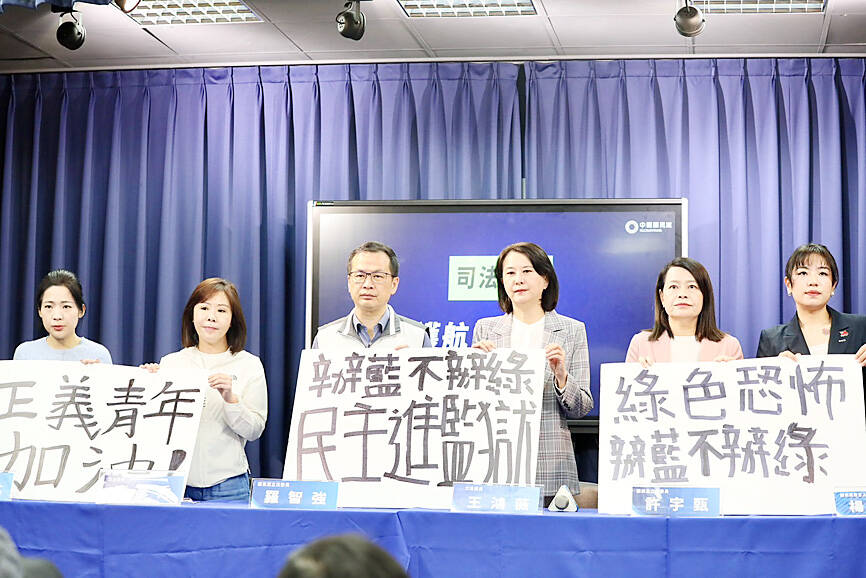Six people early yesterday were released on bail, and another was released without bail, after being questioned over their alleged involvement in the falsification of signatures on recall vote petitions targeting Democratic Progressive Party (DPP) lawmakers.
The case relates to two recall vote campaigns directed at DPP legislators Rosalia Wu (吳思瑤) and Wu Pei-yi (吳沛憶), who represent Taipei’s first and fifth electoral districts.
Liu Ssu-yin (劉思吟), Lai Yi-jen (賴苡任) and Man Chih-kang (滿志剛) were each released on NT$500,000 bail, Lee Hsiao-liang (李孝亮) and Lin Jui (林叡) each posted bail of NT$300,000, while Chen Kuan-an (陳冠安) was released on NT$200,000 bail, the Taipei District Prosecutors’ Office said.

Photo: CNA
Liu, Lai, Man and Chen are members of the Chinese Nationalist Party (KMT) Youth League.
The six suspects are barred from leaving Taiwan, prosecutors said.
Chang Ko-chin (張克晉), who has led the campaign targeting Rosalia Wu, was questioned as a suspect and released without bail.
Prosecutors also questioned as potential witnesses Hsieh Li-hua (謝麗華), a co-organizer of the campaign targeting Wu Pei-yi; Hsieh’s husband, surnamed Chen (陳); Jan Chia-wen (詹嘉文), lead proposer in the first stage of the recall campaign against Rosalia Wu; and Lee’s mother, surnamed Chen (陳).
After six residences were searched on Monday as part of the investigation, some KMT members said that prosecutors were targeting opposition supporters for political reasons.
KMT lawmakers Wang Hung-wei (王鴻薇), Lee Yen-hsiu (李彥秀), Lo Chih-chiang (羅智強) and Hsu Chiao-hsin (徐巧芯) appeared outside the Taipei District Prosecutors’ Office on Monday night to protest what they called “judicial injustice” and “political persecution.”
Dozens of police officers from Taipei’s Zhongzheng First Precinct were dispatched to the scene, police said.
The investigation into alleged signature fraud was launched last month after DPP members, including party spokesman Justin Wu (吳崢) and Taipei City Councilor Liu Yao-jen (劉耀仁), filed complaints of possible forgery and contraventions of the Personal Data Protection Act (個人資料保護法), prosecutors said.
The Ministry of Justice Investigation Bureau began collecting information from the Central Election Commission and the Taipei City Election Commission.
Prosecutors said several signatures on the recall petitions were submitted with a signature without the namesake’s knowledge or consent.
Under the Public Officials Election and Recall Act (公職人員選舉罷免法), to recall district-elected lawmakers, signatures from at least 1 percent of the total number of eligible voters in the district must be collected in the first round. At least 10 percent must be obtained in the second round before a recall vote can be initiated.
Meanwhile, New Taipei City investigators yesterday morning searched the KMT’s office in Banciao District (板橋), questioning three people who are leading efforts to recall New Taipei City DPP legislators as well was two people who work in the office.
Lee Ching-hsiang (李清祥) and Tan Chen-yao (譚鎮耀), who are leading recall efforts against DPP legislators Wu Chi-ming (吳琪銘) and Su Chiao-hui (蘇巧慧) respectively, as well as Wang Yu-jen (王昱人), who helped organize the efforts, were summoned for questioning regarding allegations of forgery involving recall petition signatures.
Later yesterday, New Taipei City investigators also searched the KMT’s office in Sanchong District (三重), and took in for questioning staff member Lo Da-yu (羅大宇).
Additional reporting by Huang Tzu-yang and Lo Kuo-chia

Beijing could eventually see a full amphibious invasion of Taiwan as the only "prudent" way to bring about unification, the US Department of Defense said in a newly released annual report to Congress. The Pentagon's "Annual Report to Congress: Military and Security Developments Involving the People's Republic of China 2025," was in many ways similar to last year’s report but reorganized the analysis of the options China has to take over Taiwan. Generally, according to the report, Chinese leaders view the People's Liberation Army's (PLA) capabilities for a Taiwan campaign as improving, but they remain uncertain about its readiness to successfully seize

Taiwan is getting a day off on Christmas for the first time in 25 years. The change comes after opposition parties passed a law earlier this year to add or restore five public holidays, including Constitution Day, which falls on today, Dec. 25. The day marks the 1947 adoption of the constitution of the Republic of China, as the government in Taipei is formally known. Back then the Chinese Nationalist Party (KMT) governed China from Nanjing. When the KMT, now an opposition party in Taiwan, passed the legislation on holidays, it said that they would help “commemorate the history of national development.” That

Taiwan has overtaken South Korea this year in per capita income for the first time in 23 years, IMF data showed. Per capita income is a nation’s GDP divided by the total population, used to compare average wealth levels across countries. Taiwan also beat Japan this year on per capita income, after surpassing it for the first time last year, US magazine Newsweek reported yesterday. Across Asia, Taiwan ranked fourth for per capita income at US$37,827 this year due to sustained economic growth, the report said. In the top three spots were Singapore, Macau and Hong Kong, it said. South

Snow fell on Yushan (Jade Mountain, 玉山) yesterday morning as a continental cold air mass sent temperatures below freezing on Taiwan’s tallest peak, the Central Weather Administration (CWA) said. Snowflakes were seen on Yushan’s north peak from 6:28am to 6:38am, but they did not fully cover the ground and no accumulation was recorded, the CWA said. As of 7:42am, the lowest temperature recorded across Taiwan was minus-5.5°C at Yushan’s Fengkou observatory and minus-4.7°C at the Yushan observatory, CWA data showed. On Hehuanshan (合歡山) in Nantou County, a low of 1.3°C was recorded at 6:39pm, when ice pellets fell at Songsyue Lodge (松雪樓), a